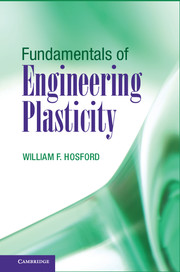Book contents
- Frontmatter
- Contents
- Preface
- 1 An Overview of the History of Plasticity Theory
- 2 Yielding
- 3 Stress and Strain
- 4 Isotropic Yield Criteria
- 5 Bounding Theorems and Work Principles
- 6 Slip-Line Field Theory
- 7 Anisotropic Plasticity
- 8 Slip and Dislocations
- 9 Taylor and Bishop and Hill Models
- 10 Pencil Glide Calculations of Yield Loci
- 11 Mechanical Twinning and Martensitic Shear
- 12 Effects of Strain Hardening and Strain-Rate Dependence
- 13 Defect Analysis
- 14 Effects of Pressure and Sign of Stress State
- 15 Lower-Bound Models
- 16 Plasticity Tests
- Index
- References
1 - An Overview of the History of Plasticity Theory
Published online by Cambridge University Press: 05 June 2013
- Frontmatter
- Contents
- Preface
- 1 An Overview of the History of Plasticity Theory
- 2 Yielding
- 3 Stress and Strain
- 4 Isotropic Yield Criteria
- 5 Bounding Theorems and Work Principles
- 6 Slip-Line Field Theory
- 7 Anisotropic Plasticity
- 8 Slip and Dislocations
- 9 Taylor and Bishop and Hill Models
- 10 Pencil Glide Calculations of Yield Loci
- 11 Mechanical Twinning and Martensitic Shear
- 12 Effects of Strain Hardening and Strain-Rate Dependence
- 13 Defect Analysis
- 14 Effects of Pressure and Sign of Stress State
- 15 Lower-Bound Models
- 16 Plasticity Tests
- Index
- References
Summary
INTRODUCTION
Plasticity theory deals with yielding of materials, often under complex states of stress. Plastic deformation, unlike elastic deformation, is permanent in the sense that after stresses are removed the shape change remains. Plastic deformations usually occur almost instantaneously, but creep can be regarded as time-dependent deformation plastic deformation.
There are three approaches to plasticity theory. The approach most widely used is continuum theory. It depends on yield criteria, most of which are simply postulated without regard to how the deformation occurs. Continuum plasticity theory allows predictions of the stress states that cause yielding and the resulting strains. The amount of work hardening under different loading conditions can be compared.
A second approach focuses on the crystallographic mechanisms of slip (and twinning), and uses understanding of these to explain continuum behavior. This approach has been quite successful in predicting anisotropic behavior and how it depends on crystallographic texture. Ever since the 1930s, there has been increasing work bridging the connection between this crystallographic approach and continuum theory.
Information
- Type
- Chapter
- Information
- Fundamentals of Engineering Plasticity , pp. 1 - 5Publisher: Cambridge University PressPrint publication year: 2013
